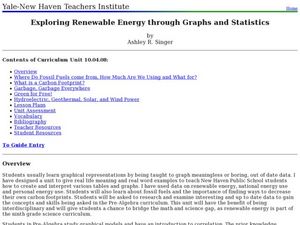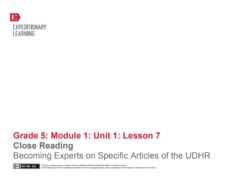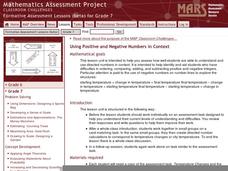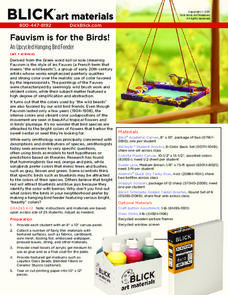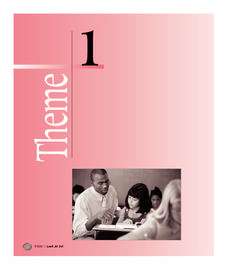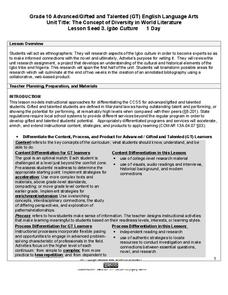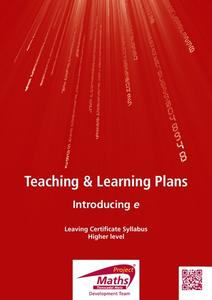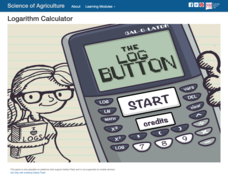Curated OER
Burr Airlines Flight to Asia: Building Inquiry Skills
What a wonderful way to explore this topic! Learners take an imaginary trip to Asia, take a visual tour, and formulate questions for a research project. As a final project, they create a travel brochure.
Curated OER
Exploring Renewable Energy Through Graphs and Statistics
Ninth graders identify different sources of renewable and nonrenewable energy. In this math lesson, learners calculate their own carbon footprint based on the carbon dioxide they create daily. They use statistics to analyze data on power...
Curated OER
Student Opinion: What Small Things Have You Seen and Taken Note of Today?
An interesting and unusual topic for a news article, this resource from the New York Times website asks learners to take a moment and consider all the things they notice during a typical day. Based of the editorial piece "Things I Saw"...
Curated OER
Less vs. Fewer
When should you use less, and when should you use fewer? Straighten out this dilemma with a helpful resource about using less vs. fewer based on sentence context clues. After reading detailed instructions and examples, young learners...
EngageNY
Close Reading: Becoming Experts on Specific Articles of the UDHR
A continuation of the previous lesson, which is part of a larger group of lessons on human rights (see additional materials). Here, in Lesson 7, your class will explore more articles from the Universal Declaration of Human Rights. After...
Hawaiʻi State Department of Education
Characters from a Box
Character analysis is a skill we use when we read literary works or want to write a good story. Learners will use drama to practice character analysis while focusing on the details that make characters act the way they do. They'll each...
Mathematics Assessment Project
Using Positive and Negative Numbers in Context
Measure the temperature of your math class with a temperature-based lesson on adding and subtracting rational numbers. The thermometer serves as a vertical number line for learners as they work together to solve a temperature change...
National Geographic
Genetic Markers: Connecting the Dots
Biology buffs simulate how genetic markers are passed among populations in order to understand how these markers can help anthropologists map human migration. A couple of volunteers leave the room while you walk the remaining learners...
Austin Independent School District
Visual Discovery Note Taking Sheets
Step into history and step out with a new understanding of events. These strategies bring a new level of understanding of key events by asking viewers to engage in and respond to projected images. Complete directions for the activity, a...
Achievement Strategies
Unit/Chapter Design Template
A thorough lesson plan template allows teachers to design balanced and standards-based lessons for any grade. The template includes spaces for unit vocabulary and concepts, objectives, and additional resources.
National Gallery of Canada
My World
Art can tell viewers about an artist's personality and background. Have your learners look at Inuit art and consider subject matter and how it relates to the artist and his or her world. The related art project requires pupils to create...
Dick Blick Art Materials
Fauvism is for the Birds!
Here's a art project that lets kids use bold colors to express their inner wild beasts, and maybe even attract a few wild birds. Using old picture frames, canvases, and screen mesh, young fauvists craft bird feeders and decorate their...
Houghton Mifflin Harcourt
Look at Us!: Challenge Activities (Theme 1)
Challenge your advanced learners with this set of activities based around a common theme. Learners draw, research, share, retell stories, compare and contrast, and more over the course of these activities, which focus mostly on animals...
Maryland Department of Education
The Concept of Diversity in World Literature Lesson 3: Igbo Culture
What cultural concepts must readers understand in order to connect to Things Fall Apart? As part of their study of Chinua Achebe’s novel, class members research Nigeria and the Igbo culture to create a collaborative, web-based, annotated...
Boston Public Schools
What's in a Biography?
Reinforce research skills, close reading, teamwork, and biographical writing skills with one collaborative instructional activity. Groups create slide shows detailing the elements of a biography through a presentation on a famous...
It's About Time
How Might Global Warming Affect Your Community?
What effects will global warming have on your community? This last installment of a six-part series focuses on the effects that global warming may have on a community. Brainstorming and discussion allow groups to independently develop...
National Wildlife Federation
It's a Green Revolution: An Introduction to Eco-Schools USA
Eco-schools is a project of the National Wildlife Federation and empowers schools to manage their schools with a green focus. Scholars work to define environment and sustainability and springboard this into learning the eight pathways...
US National Library of Medicine
Drug Use and Abuse: Past and Present
Pick your poison: tobacco, alcohol, opiates, cocaine, or marijuana. An online exhibition launches a research project that asks groups to select one of the five drugs and gather information on how the use of the drug and the regulations...
Cornell University
Beam Focusing Using Lenses
Explore optics using an inquiry-based experimental approach! Young scholars use a set of materials to design and build a unit capable of focusing a beam of light. They experiment with different lenses to determine the best approach to...
Science 4 Inquiry
The Ups and Downs of Populations
Life has its ups and downs ... especially if you're an animal! Biology scholars engage in a population study through an inquiry-based lesson. Pupils work together to explore the factors that affect deer populations, then examine the...
Project Maths
Introduction to e
First there was pi and now there's e. A discovery-based lesson helps learners find a pattern in compound interest as the compounding period changes. Their investigation results in the discovery of the number e. The lesson is the first in...
K20 Learn
Beyond the Zombie Wars: Understanding Culture
The zombies have invaded! Only a few safe regions remain, and class members must decide where they and the remaining world refugees should flee. After researching the cultures and creating poster presentations of various parts of the...
Learning Games Lab
The Magic of Reading Graphs
Making conclusions from graphs doesn't need to seem like magic. Learners explore an interactive lesson on reading graphs to strengthen their skills. The content discusses how to read the axes of a graph and draw conclusions based on the...
Learning Games Lab
Logarithm Calculator
Support your young scientists' knowledge of logarithms with a quick video lesson. The instruction first presents the relationship between a base-10 logarithm and an exponential equation. It then demonstrates how to use a calculator to...
Other popular searches
- Project Based Learning
- Project Based Learning Plans
- Project Based Learning Math
- Project Based Learning Science
- Project Based Lessons
- Project Based Learning Music
- Project Based Learning History
- Project Based Learning
- Project Based Learning Health
- Project Based Learning Fall
- Project Based Lesson Plans
- Project Based Learning English



